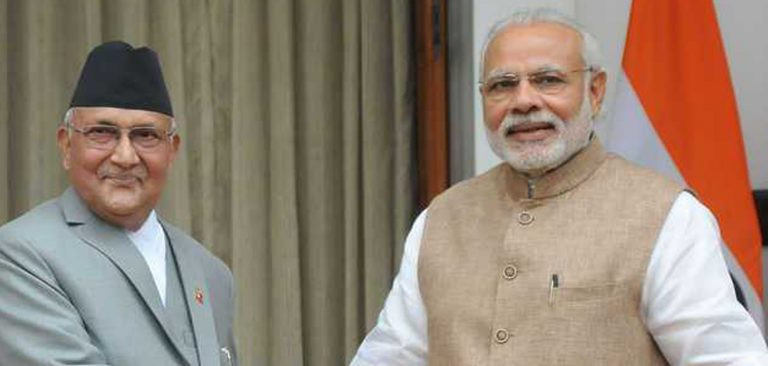Much was expected of the India visit of Foreign Minister Pradeep Gyawali played up by Prime Minister (PM) KP Sharma Oli while addressing a rally of his CPN faction a week before the visit claiming he has brought back bilateral relation with India on track.
But Indian PM Narendra Modi refused to even meet Gyawali who went to New Delhi on Thursday to take part in the Nepal-India Joint Commission meeting.
Gyawali met his Indian counterpart S Jaishankar at the Hyderabad House in New Delhi on Friday and then Indian Defense Minister Rajnath Singh at the latter's residence in Akbar Road on Saturday. But Gyawali could not get time from Modi despite trying until the last hour.
Fifteen citizen leaders including former chief of the Commission for Investigation of Abuse of Authority (CIAA) Surya Nath Upadhyaya, former chief secretaries Leela Mani Paudyal and Som Lal Subedi, and others had issued a statement stating that Gyawali should not sign agreements with long-term significance during his India visit as a minister representing a care-taker government before the visit.
But the visit was still expected to resume talks on border dispute and discuss other significant issues. But Gyawali could not reach agreement even on COVID-19 vaccines with India just assuring that they will consider the issue with priority.
The biggest snub, however, came from Modi who refused to grant Gyawali even an audience despite efforts until the last hour, according to an official part of Gyawali's delegation.
Visiting foreign ministers are usually granted courtesy call with the head of government of the host country if not the head of state during an official visit in diplomatic practice.
But Modi didn't grant Gyawali an audience despite Oli repeatedly claiming that Nepal-India relation should be on an even keel. To make matters worse, the snub to Gyawali comes after both Oli and President Bidya Devi Bhandari had recently met visiting Indian Foreign Secretary Harsh Vardhan Shringla and Indian Army Chief Manoj Mukund Naravane.
Oli had even met chief of the Research and Analysis Wing (RAW) Samant Goel before that and the government had argued that Oli met Goel as an emissary of Modi and not as intelligence chief when the meeting was widely condemned by opposition parties and even Oli's rivals in ruling CPN.
Former foreign minister Prakash Chandra Lohani has tweeted that snub of a foreign minister of neighboring Nepal on an official visit is unbecoming. "This shows our PM can't implement what he speaks on one hand. The Nepali side should have confirmed who the foreign minister will meet while he was still here," Lohani told Setopati when asked why the snub happened. "Modi, on the other hand, need not have invited him. Granting him an audience to show courtesy would have been better despite all the grievances once he was invited. This seems like an insult not just of Foreign Minister Gyawali but all the Nepalis."
He called the visit a failure pointing also at the lack of a joint statement after the visit and not just Modi's snub. "The visit materialized and the door for dialogue was opened. But we seemed to have so many differences that we could not even find common words to relay that. We could not even issue a joint statement."
Former foreign secretary Dinesh Bhattarai said that India displayed conflicting attitude by calling the foreign minister after House dissolution for an official visit, and not granting the minister audience with the PM even when he wanted it so badly. "This behavior is embarrassing not just for Minister Gyawali but for all the Nepalis.
He also referred to how Oli calls the relation based on equality and pointed how India, that calls bilateral relationship with Nepal special, did not grant audience with a foreign minister when Oli entertained even the RAW chief.
Some say that Modi may have avoided the meeting with minister of caretaker government worrying the kind of message that may send but Bhattarai does not buy that. "Indian PM not meeting a minister of caretaker government does not make sense when the foreign minister had an official meeting and even hosted a lunch in his honor," he argued. "Time will gradually revel the kind of message the Indian side wants to send through its behavior during this visit."
Indian analysts, meanwhile, say that India through the snub by Modi has sent the message that it expects more flexibility from Nepal. Former Indian ambassador to Nepal Rakesh Sood has told The Hindu that India wants more flexibility from Nepal and whatever has happened now does not suffice.

